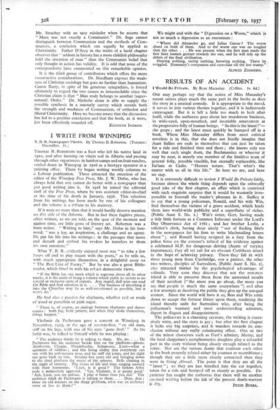RESULTS OF AN ACCIDENT
I Would Be Private. By Rose Macaulay. (Collins. 75. 6d.) ONE may perhaps say that the action of Miss Macaulay's recent satires plays much the same part in the books as does
the story in a musical comedy. It is appropriate to the mood, it serves to join various thetnes together, mid it is ludicrously extravagant. But it is left a little too much to look after itself, while the authoress goes about her murderous business,
in wide-eyed, open-mouthed, and insatiable amazement at the progressive folly of human beings. "So this is the latest I"—
she' gasps ; and the latest must quickly be bumped off in a book. Where Miss Macaulay differs from most satirical novelists is in this, that she does not fondly imagine that Aunt Sallies are ends in themselves that can just be taken for a ride and finished then and there ; she knows only too well that each single Aunt, the Buchmanites or whoever it may be next, is merely one member of the limitless team of general folly, possible vincible, but eternally replaceable, like Italians at Cadiz. "Human nature. That's what's the matter with us all in this life." So here we are, and here we stay.
It is extremely difficult to review I Would Be Private fairly, because almost the whole thing depends upon the colossally good joke of the first chapter, an affair which is contrived with such exquisite surprise that it would be wantonly irres- ponsible to forestall the reader's pleasure in it. Suffice it to say that a young policeman, Ronald, and his wife Win, find themselves the victims of a grave accident, which lands them into world-wide publicity and a superfluity of riches. (Public Aunt S. No. r.) Win's sister, Gert, having made a tidy little fortune as a Common Informer under the Lord's Day Observance Act of 1781; and her brother Leslie, a solicitor's clerk, having done nicely "out of finding libels in the newspapers for his firm to write blackmailing letters about " ; and Ronald having resigned in a fury from the police force on the coroner's refusal of his evidence against a celebrated M.P. for dangerous driving (Aunts of varying importance), they all set sail for an obscure Caribbean island in the hope of achieving privacy. There they fall in with three young men from Cambridge, one a painter, the other two writers, disciples of Surrealism, (Public Aunt S. No. 2), also attracted thither by the psychological advantages of solitude. Very soon they discover that not the remotest island is able to preserve them from the unwanted results of their accident (" the more you go about, the more you see that people is much the same everywhere ") and after a few attempts at deceiving the public they give up the unequal contest. Since the world will have it so, Ron and Win settle down to accept the fortune thrust upon them, rendering the island thereby unfit 'for Surrealists who, after being the policeman's warmest and most understanding admirers, depart in disgust and disappointment.
The policeman is a charming creature, the writing is exces- sively witty, and the story is gay ; but after the first chapter it lacks any big surprises, and it wanders towards its con- clusion without any really culminating effect. One or two of the minor characters such as Gert's admirer, Monty, and the local clergyman's nymphomaniac daughter play a colourful part in the story without being closely enough related to the satire. Nor are the various Aunts that confront each other in the book properly related either by contrast or resemblance ; though they are a little more closely connected than they were in Going Abroad. The point is that they are all the " latest " ; so they are just bundled into the car together, taken for a ride and bumped off as cleanly as possible. Ex- perience has taught the authoress that there will be another car-load waiting before the ink of the present death-warrant














































 Previous page
Previous page